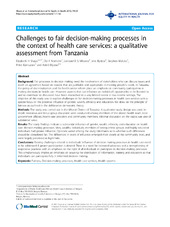| dc.contributor.author | Shayo, Elizabeth H. | en_US |
| dc.contributor.author | Norheim, Ole Frithjof | en_US |
| dc.contributor.author | Mboera, Leonard E. G. | en_US |
| dc.contributor.author | Byskov, Jens | en_US |
| dc.contributor.author | Maluka, Stephen | en_US |
| dc.contributor.author | Kamuzora, Peter | en_US |
| dc.contributor.author | Blystad, Astrid | en_US |
| dc.date.accessioned | 2013-05-19T09:27:03Z | |
| dc.date.available | 2013-05-19T09:27:03Z | |
| dc.date.issued | 2012-06-07 | eng |
| dc.identifier.issn | 1475-9276 | |
| dc.identifier.uri | https://hdl.handle.net/1956/6625 | |
| dc.description.abstract | Background: Fair processes in decision making need the involvement of stakeholders who can discuss issues and reach an agreement based on reasons that are justifiable and appropriate in meeting people’s needs. In Tanzania, the policy of decentralization and the health sector reform place an emphasis on community participation in making decisions in health care. However, aspects that can influence an individual’s opportunity to be listened to and to contribute to discussion have been researched to a very limited extent in low-income settings. The objective of this study was to explore challenges to fair decision-making processes in health care services with a special focus on the potential influence of gender, wealth, ethnicity and education. We draw on the principle of fairness as outlined in the deliberative democratic theory. Methods: The study was carried out in the Mbarali District of Tanzania. A qualitative study design was used. In-depth interviews and focus group discussion were conducted among members of the district health team, local government officials, health care providers and community members. Informal discussion on the topics was also of substantial value. Results: The study findings indicate a substantial influence of gender, wealth, ethnicity and education on health care decision-making processes. Men, wealthy individuals, members of strong ethnic groups and highly educated individuals had greater influence. Opinions varied among the study informants as to whether such differences should be considered fair. The differences in levels of influence emerged most clearly at the community level, and were largely perceived as legitimate. Conclusions: Existing challenges related to individuals’ influence of decision making processes in health care need to be addressed if greater participation is desired. There is a need for increased advocacy and a strengthening of responsive practices with an emphasis on the right of all individuals to participate in decision-making processes. This simultaneously implies an emphasis on assuring the distribution of information, training and education so that individuals can participate fully in informed decision making. | en_US |
| dc.language.iso | eng | eng |
| dc.publisher | BioMed Central | eng |
| dc.relation.ispartof | <a href="http://hdl.handle.net/1956/10542" target="blank">Stakeholder engagement in health-related decision making. The Case of Prevention of Mother-to-Child HIV Transmission in Tanzania</a> | |
| dc.rights | Attribution CC BY | eng |
| dc.rights.uri | http://creativecommons.org/licenses/by/2.0/ | eng |
| dc.title | Challenges to fair decision-making processes in the context of health care services: a qualitative assessment from Tanzania | en_US |
| dc.type | Peer reviewed | |
| dc.type | Journal article | |
| dc.description.version | publishedVersion | en_US |
| dc.rights.holder | Copyright 2012 Shayo et al.; licensee BioMed Central Ltd. | |
| dc.source.articlenumber | 30 | |
| dc.identifier.doi | https://doi.org/10.1186/1475-9276-11-30 | |
| dc.identifier.cristin | 964206 | |
| dc.source.journal | International Journal for Equity in Health | |
| dc.source.40 | 11 | |

